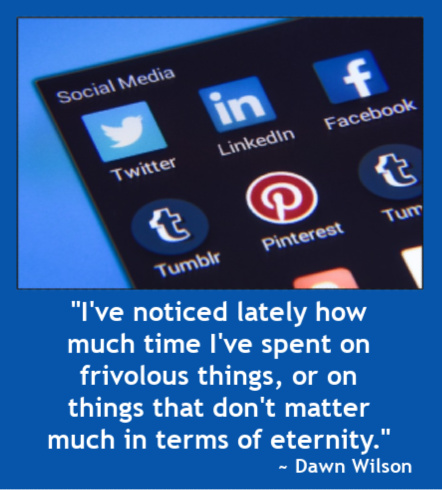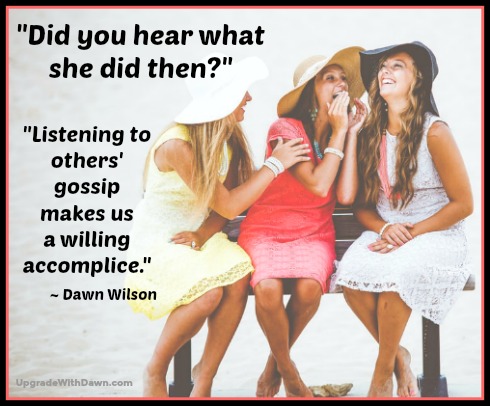Entertaining Time Thieves—Part 1
Happy New Year! So many make New Year's resolutions. I (Dawn) really do not. And yet, do I?
I've become aware that I have allowed "time thieves" to steal precious hours. One of my goals this year is to "redeem" (buy up) more time that I can use for the Kingdom of God. Hopefully, that is your desire as well.
In this Time Management UPGRADE (which has two parts), I want to help us focus on how we're spending our time. It's a huge topic and a little intimidating, but an important one in light of eternity.
Are you entertaining "time thieves"? What are they stealing, besides your time?
I recently spent two hours "scrolling." It went by so quickly, and I'll never get those two hours back.
I've noticed lately how much time I've spent on frivolous things, or on things that don't matter much in terms of eternity.
For example, as of May 2023, I have loaded 5,359 pins onto Pinterest into 127 categories. I have only once accessed these pins to actually USE any one of the entries!
Why on earth do I continue to load Pinterest pins that I will likely never use?
Yes, it's enjoyable. Yes, I appreciate a place to store things I see that I "like." And yes, I will probably store special recipes. But I've spent far too much time storing recipes I'll never use. It's like shopping for things we don't need.
Waste of time.
Another example. I spend hours on my iPhone scrolling through cute videos, informative videos, funny videos, shocking videos, tear-jerker videos, etc.
It's so easy to do. It's easy to vegetate with my iPhone rather than doing something productive.
Massive waste of time!
Yes, we need time to relax.
Yes, we need time to allow creative juices to form.
But we also need to BE CAREFUL not to waste vast amounts of time.
Perhaps we might justify scrolling on our iPhone at an airport, waiting for a flight. Or at a doctor's office. But think about that. We have time to scroll, but not to read scripture on a scripture app, or memorize scripture on a memorization app?
God help us to stop justifying our "lack of time." God help me!
We rationalize that we don't have time for a special project—to clean out files, to draft an email, to clean our garage, to write a book or article, to write an encouraging note, etc.—but we had time to pin and scroll.
Unfortunately, many of us don't have a wise strategy for social media use. We so often want the easy-and-not-challenging thing, not the harder-but-more productive thing.
Why is this so important?
We think we have more time to do what's valuable and productive. But the Bible says, don't be so sure! James, Solomon, and Job said we can't be assured of what will happen tomorrow.
... you do not even know what will happen tomorrow. ... You are a mist that appears for a little while and then vanishes (James 4:14 NIV)
Do not boast about tomorrow, for you do not know what a day may bring (Proverbs 27:1 NIV).
My days come and go swifter than the click of knitting needles, and then the yarn runs our—an unfinished life! (Job 7:6 MSG)
One would think I would remember this, having gone through years of struggle for life after my Multiple Myeloma diagnosis.
How soon we forget about the brevity of life!
In light of our short lifespan, Paul encourages us to make "the best use" of our time.
How do we do that? How do we stop entertaining time thieves and make the very best use of our time?
1. Live with an Eternal Perspective.
As noted above, our life is a "mist," a vapor that quickly shows up and then vanishes, like steam rising from a teapot. We make great plans for our future on earth, but they may be cut short. We need to make every "today" count.
Realizing our time is short should help us stop spinning our wheels spiritually and make better choices. We'll want to be more conscious of what we spend time accumulating. We'll also want to consider what we will leave to those who follow us, and the example of time stewardship we are leaving them now.
Also important—living in light of eternity isn't simply a matter of not doing some things; we also won't want to miss any opportunities to go good.
2. Choose Activities with Purpose.
In order to use time wisely, we have to be purposeful. And in order to be purposeful, we need to ask ourselves some questions. Questions like: Why am I doing this? What value does this have for today? What value does this have for eternity? Is this developing my spiritual maturity or hindering it?
It's crucial to plan time purposefully rather than letting it slip through our fingers.
- Plan times of work (Colossians 3:23-24) with purpose. That plan includes doing our best for our earthly boss, remembering that we ultimately serve our heavenly Master. (If we work "for ourselves," that's good to remember too.)
- Plan times of rest (Mark 6:31; Psalm 127:2) with purpose. Plan to re-energize, nap, or "chill out." Plan regular vacations.
- Plan times to be creative with purpose, allowing creativity to bloom into beautiful and functional things to the glory of God (Proverbs 22:29).
- Plan times to shop with purpose—not spending indiscriminately but investing in worthy things, knowing our "wealth" comes from Him (1 Chronicles 29:12-14; 1 Timothy 6:17; Matthew 6:19-21).
- Plan time for growth—invest in personal spiritual growth (Colossians 1:9-10; 2:6-7; 2 Peter 1:5-8; 2 Peter 3:18) and in the lives of others (1 Thessalonians 5:11; Hebrews 10:24).
- Plan time to meditate on the use of time, and consider what matters most to God and how we can spend more time on those things. Our time is His, a God-given resource, and He can help us use it best (Proverbs 16:9).
I'm sure you can think of other things to plan for.
The things we plan for will become our priorities, so we must live with intentionality.
In Part 2, we'll consider two more ways to stop time thieves and make the most of our time.
Are you living with an eternal perspective and making wise choices for good time maneagement? If not, what changes can you make to live with intentionality?
Dawn Wilson, founder of Heart Choices Today, is the creator of Upgrade with Dawn. She works for Revive Our Hearts revival ministry and is a regular columnist at Crosswalk.com. She and her husband Bob live in sunny Southern California, and Dawn has traveled with Him in Pacesetter Global Outreach. They have two grown, married sons, three granddaughters, and a rascally maltipoo, Roscoe.
Revive Our Hearts revival ministry and is a regular columnist at Crosswalk.com. She and her husband Bob live in sunny Southern California, and Dawn has traveled with Him in Pacesetter Global Outreach. They have two grown, married sons, three granddaughters, and a rascally maltipoo, Roscoe.
Graphics adapted, courtesy of PhotoMix-Company and Foto-Retusz at Pixabay.
 Post a Comment → Posted on
Post a Comment → Posted on  Tuesday, March 19, 2024 at 2:00PM
Tuesday, March 19, 2024 at 2:00PM  Dawn Wilson,
Dawn Wilson,  Redeem the Time,
Redeem the Time,  Time,
Time,  Time Management,
Time Management,  Time Thieves,
Time Thieves,  Time Wasters,
Time Wasters,  Upgrade with Dawn,
Upgrade with Dawn,  Use of time,
Use of time,  Wasting Time Upgrade Your Life
Wasting Time Upgrade Your Life  Accountability,
Accountability,  Time Management
Time Management 









